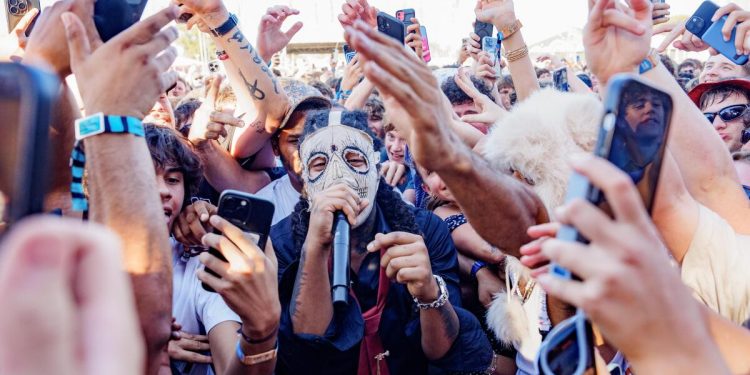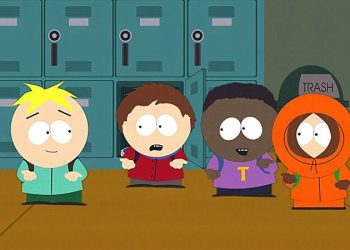When Jennifer Trujillo first heard her middle school students say “6-7” in class and explode with joy, she sought advice from an expert: her 15-year-old daughter.
Trujillo wanted to know what exactly his students were saying when they repeated the numbers and moved their hands in a juggling motion. Her daughter gave her an unsatisfactory answer: “Mom, no one knows. »
And yet the phrase “6-7” is seemingly used everywhere by children and adolescents. It’s become so infuriating for adults that at least one school has banned the phrase “6-7.”
According to the Wall Street Journal, which first reported on the trend, the phrase comes from a song by Philadelphia rapper Skrilla, who told the paper he never “gave any real meaning to it.”
Skrilla, real name Jemille Edwards, told The Times in an email that the song “Doot Doot (6 7)” wasn’t supposed to leave the recording studio, but he decided to release it in late 2024, and the teens took the phrase from there and ran with it.
The term “6-7” has become “something positive and fun that people around the world enjoy,” he wrote. “6 7!!!! Keep it up, keep it positive and remember where that energy comes from.”
“6-7” disrupts the class
The lack of meaning behind the phrase apparently gave it the ability to appear everywhere and for children to find a reason to shout it and laugh.
It was referenced in a recent episode of the four-time Emmy Award-winning series “Abbott Elementary” and made up the entire plot of the premiere episode of season 28 of South Park.
Video posted to social media showed a group of teenagers going wild at In-N-Out when Order 67 was finally called.
“You don’t realize how many times you say 67 or 6-7 in your daily life until you have a group of middle schoolers to remind you,” Trujillo said.
Trujillo, who teaches at Giano Middle School in West Covina, compared the experience to the word of the day segment on “Pee-wee’s Playhouse” from the 1980s that made everyone on the show burst into joy when the word was said.
Desarie Alvarez, 13, associate president of the eighth-grade student body at Giano Intermediate, told the Times that the phrase has created a playful buzz around campus and the playground over the past two months.
The phrase “6-7” is random, she says, but her classmates find it funny nonetheless.
“I don’t really see how it’s funny, but I’ve gotten used to it,” she said.
In some states, teachers discipline their students or ban this expression altogether when constant laughter or jeers disrupt the class.
Carlos Ochoa, principal of Giano Intermediate, admitted that some of his teachers were annoyed when the trend disrupted their classes. But most of the time, he says, his teachers follow that route and give their students a chance to yell “6-7!” ” to get it out of their system, or say it with them in hopes of making the expression uncool.
“I think the culture of our school is that we roll with the punches because you can’t fight it,” Ochoa said.
In Ochoa’s 13th year as director, he said he’s seen a lot of fads and at this point he’s just preparing for the next one.
Skrilla performs at Summerfest 2025 at Henry Maier Festival Park on June 27 in Milwaukee.
(Joshua Applegate/Getty Images)
Why the “6-7” trend has lasted
A viral trend can start, reach its peak and disappear within days or weeks.
The trick is getting it to spread in the first place, and there’s very little chance of that happening, said Karen North, a professor of digital social media and psychology at USC.
The longevity of the “6-7” trend is somewhat unusual as Skrilla released the song last year, but it only began to gain momentum when it was used on social media.
It is not known exactly when “6-7” first appeared. In March, basketball influencer Cam Wilder posted a video to YouTube of an Amateur Athletic Union game where two teenagers in the crowd turn to the camera and say “6-7.”
More recently, Charlotte Hornets basketball player LaMelo Ball, who is 6-foot-7, began using music, referencing the song and lip dubbing “6-7” in TikTok videos.
North said she believes “6-7” has come back to life because of teachers’ involvement.
“Because there’s nothing middle schoolers or elementary schoolers love more than seeing teachers get upset and try to take action against something, especially if something is impossible to ban,” she said.
A child might argue that he’s not breaking the rule if he just claps when he meets 67 people in the world, North said, or if he ends up having to say it as part of a lesson, such as in math class.
Why “6-7” Seems to Be a Generational Codeword
“Six, Seven” is one of those things where kids have this secret code that’s fun to participate in and makes them feel like they’re part of the “crowd,” North said.
It almost became a game because the children realized that adults sometimes cannot avoid saying or being exposed to the numbers 6 and 7 because they are part of everyday life.
“I have to tell you, I have a doctorate and I’m the kid that, if a teacher said ‘you can’t say 6-7 in my class,’ I would be laser focused on looking for 6-7,” North said. “I think it’s the best thing in the world.”
North wants to remind parents and teachers that every generation has its secret password. What was once the “bee’s knees” will later become “groovy,” which turns into “fire.”
What’s different about today’s spread of generational expressions is the way social media can amplify them quickly, but also give them a relatively short shelf life.
Before “6-7,” there was “skibidi,” a phrase born from a computer-animated video depicting a head emerging from a toilet. However, it is practically no longer used today.
Maybe, Trujillo thought, these absurd, silly phrases are this generation’s way of telling everyone to just have fun.
“When you think about everything our children are going through in this day and age, with all the bullying and everything that’s going on in the political world, there are a lot of other pressing things we could be worrying about,” she said. “But if we’re worried about two small numbers, you know, maybe it’s this generation telling us to relax a little bit.”









